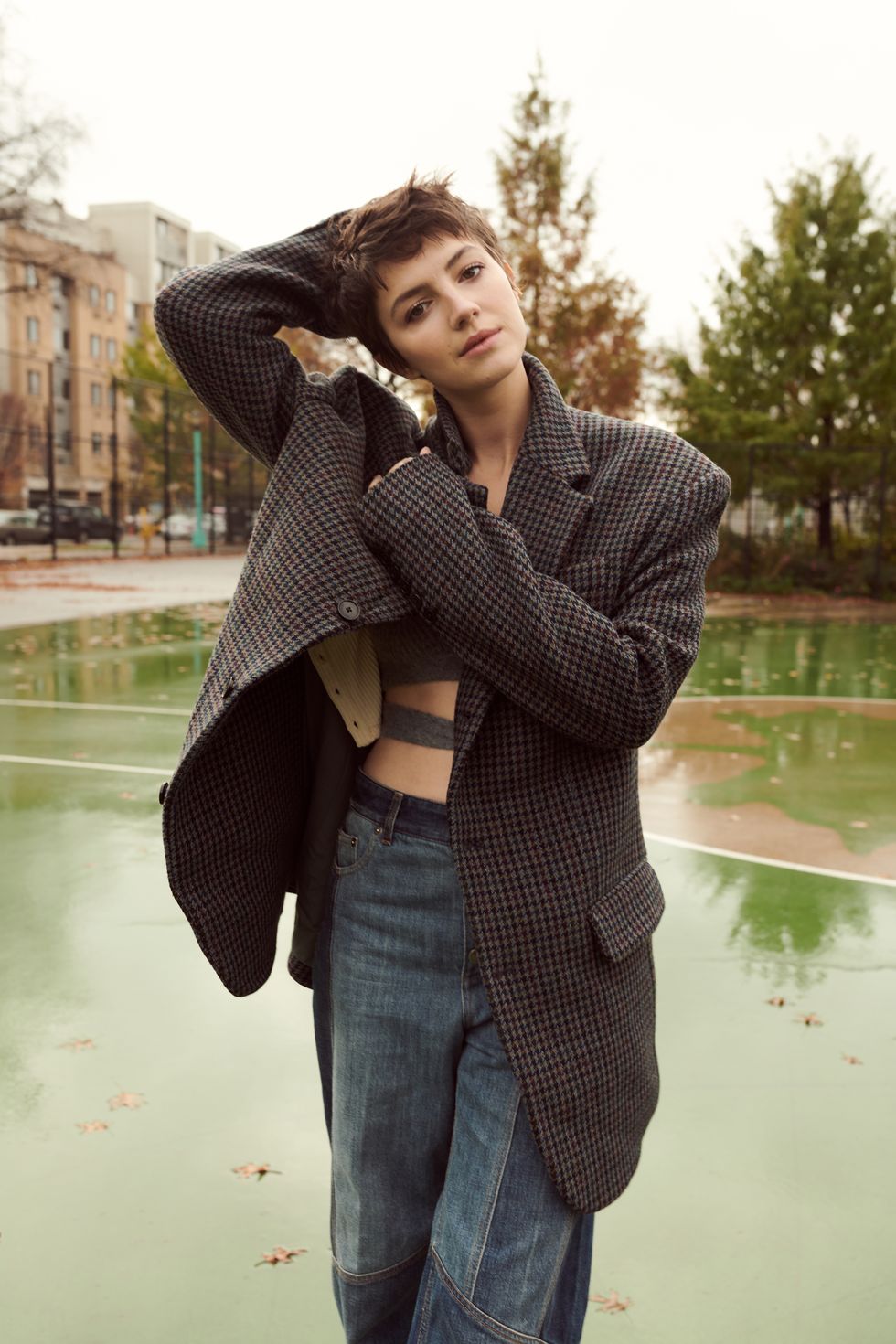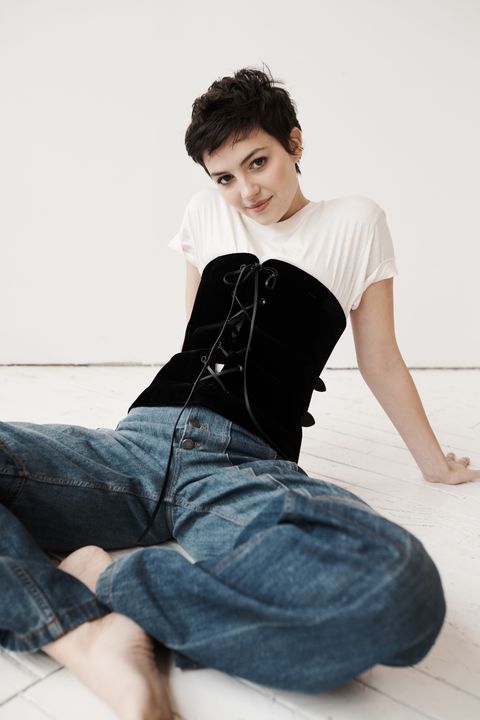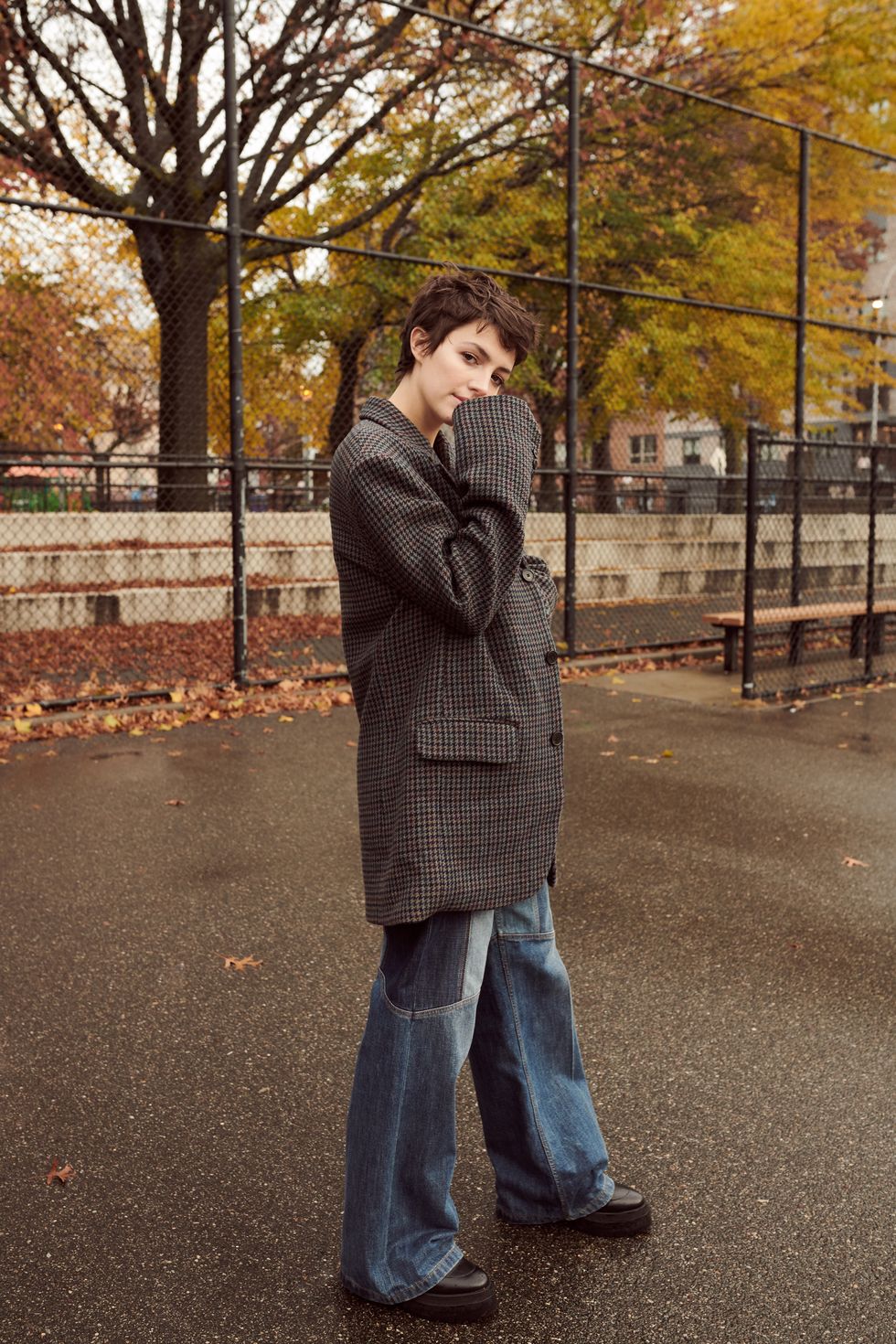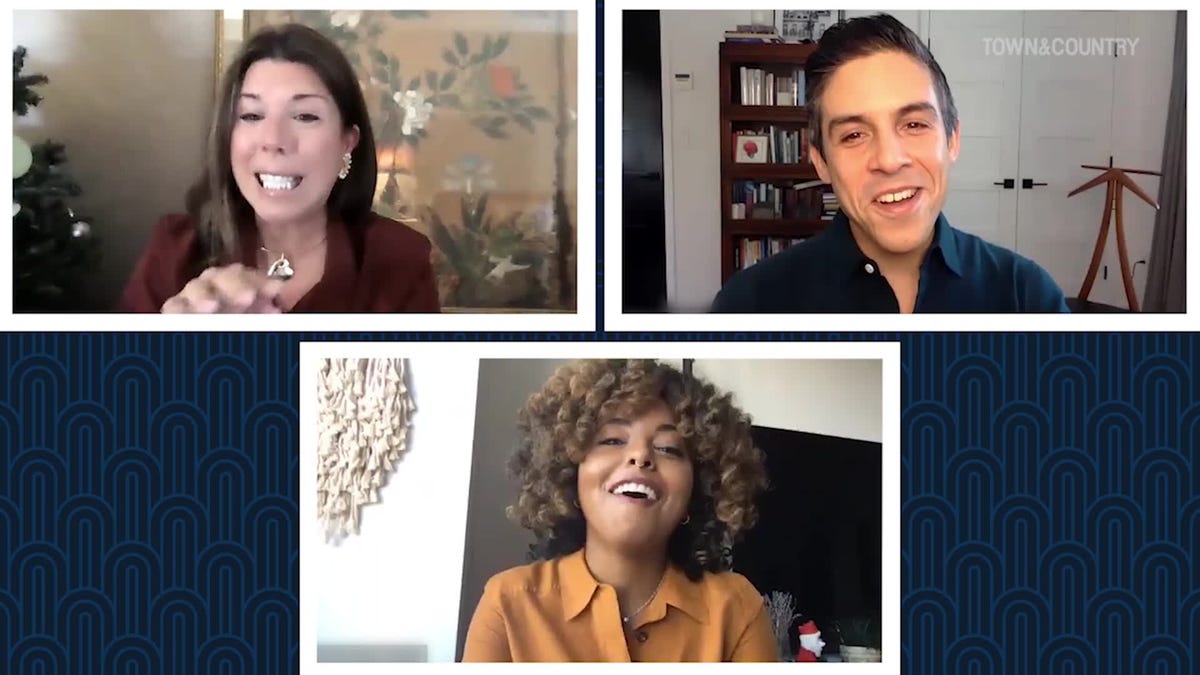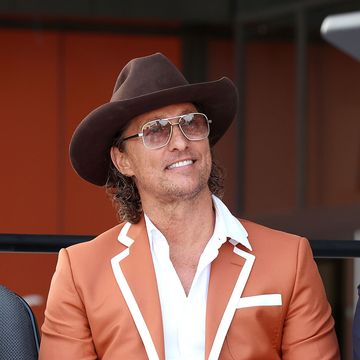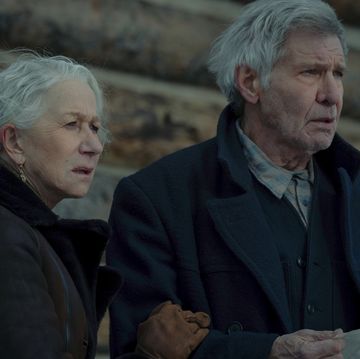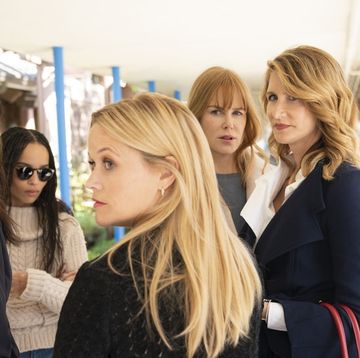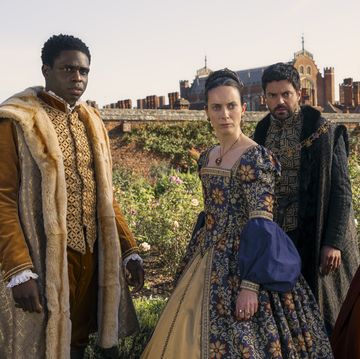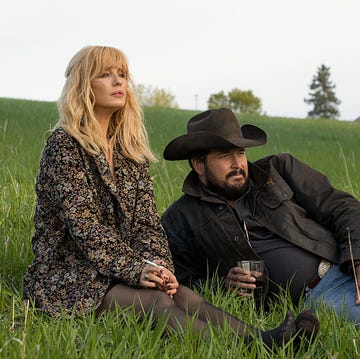Ella Hunt looks cozy in her sweatshirt. The actress is in her Brooklyn apartment, still reveling in the beauty of Amanda Gorman's poem—we're Zooming on the afternoon of Inauguration Day—and has fixed herself a cup of tea. Later, she'll introduce me to one of her two pandemic kittens (Alfie, as Simon "is sleeping somewhere"), who have turned her into "a crazy cat fanatic lady."
It's a world away from the Evergreens, the opulent, moodily-hued home that Hunt's character on Dickinson, Sue Dickinson (née Gilbert), has built with her husband Austin. After spending season one in mourning dress, haunted by grief and wavering in her promise to wed, Sue returns in season two as a top-tier socialite. Clad in the newest styles from New York and Europe, she hosts salons at her fashionable home, sipping pricey champagne and rubbing shoulders with the 19th century New England elite (think painters from the Hudson River School and writer Harriet Prescott Spofford). Her sister-in-law, Lavinia (played by Anna Baryshnikov), says it best: "It is so crazy. Sue is an influencer."
At the beginning of the season, viewers may have been a bit shaken by how much Sue had changed. But for Hunt, the surprise was how creator Alena Smith wrote her part in the first season. The actress always knew that Sue would become a society type—that's largely how the real-life Sue is remembered. "Everything that I found was of her as this infamous hostess who brought all of these extraordinary literary figures to Amherst," Hunt says. "And it was a little bit bizarre reading the scripts for season one."
She notes that there are numerous moments in season two, written in by Smith, that remind fans why Sue's begun to overcompensate: the loss of her family, and the loss of a pregnancy, made doubly painful by the need she feels to keep her miscarriage a secret. Underneath, the pain is still there, just her method of coping has changed. "There's moments where we see her looking at herself in the mirror and she takes a deep breath, and she puts a smile on again in a moment," Hunt says.
Sue's personal history wasn't the only thing Hunt had to read up on for the part. The English actress also gave herself a crash course in American politics and history (aided, surely, by moving to New York for the show). Dickinson's second season is set right before the beginning of the Civil War, and Smith isn't shy about drawing out the parallels to today's fight for racial justice; speaking to Hunt after President Joe Biden was sworn into office, just two weeks after then-President Trump incited an insurrection at the Capitol, the two eras had never seemed closer. "I'm obviously slightly terrified by American politics," Hunt says, in what surely must be an understatement, "but within the context of the show, it's thrilling to more and more see the parallels between 1850 America and America of 2020."
Not that the show doesn't have its flashes of escapism. There are scenes which offer Hunt the chance to inhabit her character through the eye of another, as a figure within Emily's (Hailee Steinfeld) overactive imagination. The climax of the newly-premiered sixth episode was one such sequence: entranced by an opera performance, Emily falls into one of her daydreams, picturing Sue, crooning to a poem by the real Emily Dickinson ("Split the Lark - and you'll find the Music -"), in the place of the opera singer.
It was a dream for Hunt, too. She's been quietly writing songs since she was a child, and recently decided to pursue her musical aspirations alongside her acting career—but she wasn't sure whether she'd get to show off her pipes in Dickinson, as it wasn't quite clear in the script what vision Emily was conjuring. And then, one day on set, "Alena just came up to me one day and went, 'Yeah, I think it is going to be you singing. I think I'd like you to be singing.' And I was like, yes," Hunt says, clenching her fists to demonstrate the emotional weight of her victory.
Ironically, at the same time as she's playing Emily's imagined Sue, trying to talk the aspiring poet out of pursuing notoriety ("Beneath all of this nonsense about fame, what is it that you crave?"), Hunt is stepping out into the limelight herself. "I went through the opposite of what Emily goes through in season two," she laughs. This season, Dickinson wrestles with the downsides of being seen—as Smith recently told Town & Country, in the age of social media, we "need to reclaim the idea of privacy" on a societal level—but as Hunt points out, sharing yourself and your work isn't all bad. "It is so tough to make any kind of art that you don't share with anyone," she says, adding, "It's not about seeking acclaim for it so much as being able to connect with people through music."
Hunt's first musical performances were all about community: at around 10 years old, she began taking the stage at an environmental festival her family visited every year. (Hunt grew up in "beautiful, rural" Devon, being nurtured and mentored by her artist parents. It's little wonder both she and her brothers wound up in creative fields as well.) She loved acting and music equally, but her work with the former took off first, when she was spotted at a school play; in her teens, industry professionals advised her to just stick to acting. "It took me a few years to really grow a pair of tits and go, 'Actually, I'm going to do both,'" she says. "And moving to New York and working on the show, which is about an artist discovering her creativity and being bold with it, really empowered me to look at my music and treat it with respect." Expect to hear her tunes later this year.
It also helps that she's found a community of musicians who make her "feel safe"—not least among them her boyfriend, The Gloaming’s Thomas Bartlett. (It was also Bartlett that paved the path for Hunt to become a cat person; meeting his parents' feline friends convinced her to take the dive with Alfie and Simon.)
That is something she shares with Emily Dickinson: people who treasure and champion her work. What hasn't changed about Sue between seasons one and two is her belief in Emily as a writer; she'll tell everyone who'll listen that Emily is the next great poet. "Sue is rooting for for Emily, and that is to be her own individual and believe in herself and move on into the world in a new way," Steinfeld explains. "Being with Sue is being at home and being safe."
And even if they're no longer sharing intimate moments, the duo clearly still have a tenderness for one another—though that's likely not enough for the strong contingent of #EmiSue obsessives, who spend their days churning out fanfic and proclaiming Taylor Swift's Evermore is all about their favorite onscreen relationship. It's hard to blame them, though. Rarely is a romantic relationship so earnestly portrayed onscreen, let alone a gay one. "I love the community that the show has brought together and I feel just tremendously supported by their love," Hunt says. (She also notes that while she did retweet something about the Swift-#EmiSue conspiracy, and she finds it lovely that fans are making these connections, she's "not actually that in-tune to what's going on there.")
And, like seemingly everything on Dickinson, their romance is based in historical scholarship. Really, the show should come with footnotes. The references come fast and stealthy, woven into distinctly 21st century dialogue voiced by singular, flawed characters, as they struggle to navigate a web of increasingly convoluted interpersonal relationships.
"I certainly think that people were living just as rich and dark and deep of lives then as we are living today. Maybe not the same—but I actually often think that people were probably a lot stranger back then."
Stranger than a culture that would produce a show where Emily Dickinson takes carriage rides with Wiz Khalifa's Death? We can only dream.
Photographs by Eric Hobbs, Styling by Sarah Slutksy, Hair by DJ Quintero, Makeup by Carolina Dali, with Styling assistant Gina Brase.

Chloe is a News Writer for Townandcountrymag.com, where she covers royal news, from the latest additions to Meghan Markle’s staff to Queen Elizabeth’s monochrome fashions; she also writes about culture, often dissecting TV shows like The Marvelous Mrs Maisel and Killing Eve.

